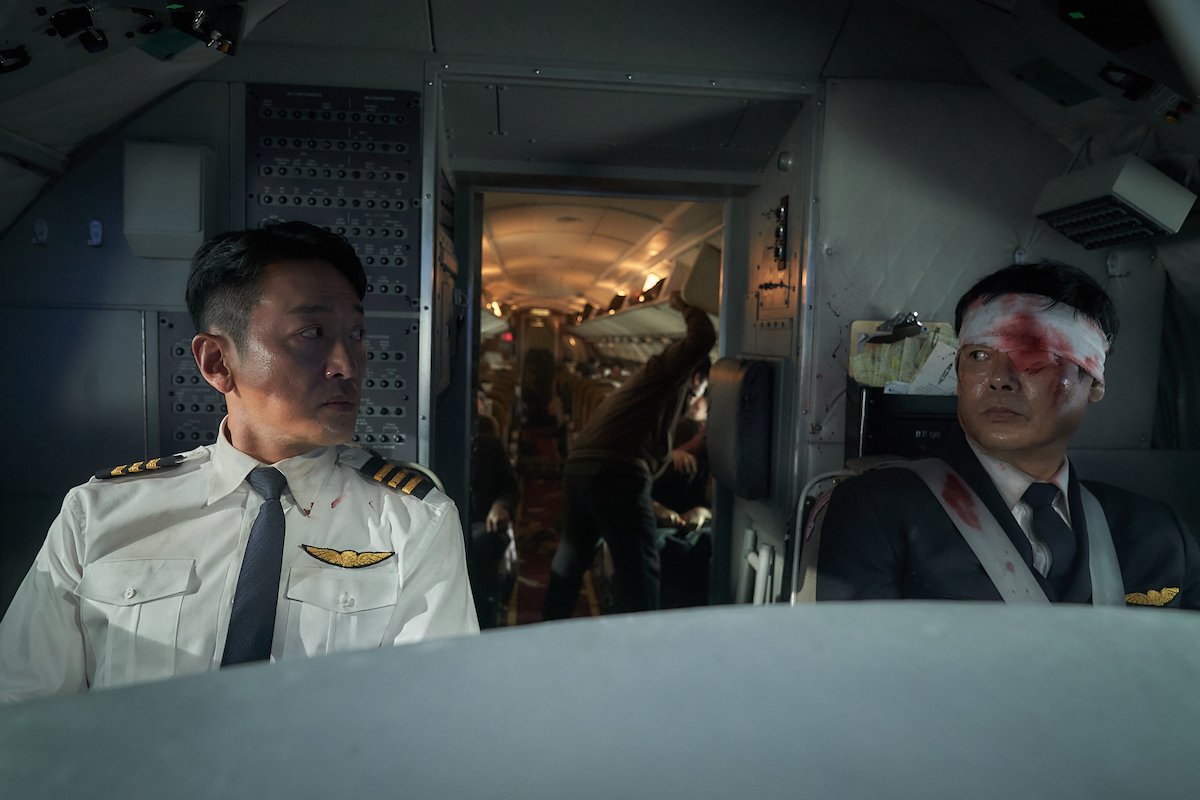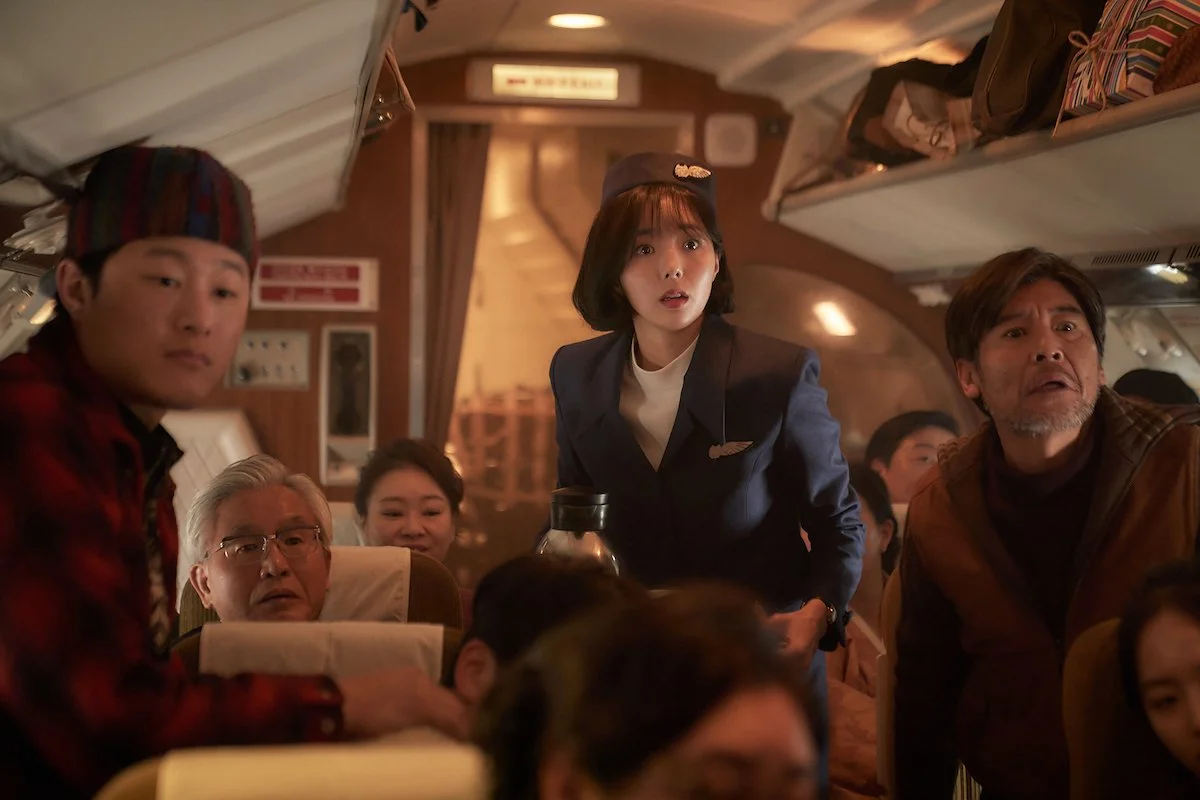Brace
Ha Jung-woo dons the aviators as the hero pilot and crashes with the best of them. That’s a compliment.
Hijack 1971
Director: Kim Seong-han • Writer: Kim Kyung-chan
Starring: Ha Jung-woo, Yeo Jin-goo, Sung Dong-il, Chae Soo-bin, Kim Dong-wook
South Korea • 1hr 40mins
Opens Hong Kong Aug 1 • IIB
Grade: B
You find yourself on a distressed flight. In this mid-air emergency you have five movie pilots to choose from to save your ass. You can have Gerard Butler’s Brodie Torrance from Plane, because it’s the most badass pilot name ever; goody-two-shoes Tom Hanks’s Sully Sullenberger in Sully; Zhang Hanyu knocking off Sully as Liu Changjian in The Captain; Denzel Washington’s ultra-cool drunk Whip Whitaker from Flight; or former flyboy Ha Jung-woo’s Tae-in in Hijack 1971 | 하이재킹. Who’s the man?
The right answer, of course, is Butleeeeeeer! but the point is you know this guy. The hero pilot is as much a trope as the One Man Wrecking Crew, but you have to admit: the relative ordinariness of the pilot makes them a teeny bit more compelling. This could be your pilot next week. I don’t know about you but I want my pilot to be heroic. So despite the inevitability of Butler, Ha (The Handmaiden, Ransomed) makes a case for himself in Kim Seong-han’s hijacking drama, loosely based on an actual hijacking drama from 1971 (duh). Kim and his partner, writer Kim Kyung-chan take a few lessons from their time working on the political thriller 1987: When the Day Comes (Seong-han was AD), also starring Ha, in tone, pacing and suspense, despite knowing how it ends (that’s a magic trick). Is Hijack 1971 a deep dive into the sociopolitical dynamics on the divided peninsula, one that deconstructs the South Korean psyche and examines the early demonisation of the North? No, not really. But it suggests those things and mines some relatively solid melodrama from the situation – one that actually happened.
Hijack 1971 begins like almost every single film ever made about an air disaster – from Alive to Society of the Snow, from Airport to Airplane!. We meet the crew as they prep the plane. We scan the terminal building for what are likely to be the passengers to watch for. No, wait. Hijack 1971 begins in 1969, when a Korean Air Lines passenger jet is hijacked and the captain is forced to take it across the border. The ROK scrambles fighters Dong-cheol (Kim Dong-wook) and his superior officer Tae-in (Ha) – to this point simply patrolling the area and playing Top Gun games (gee, think that will be important?) – to intercept and shoot the jet down if need be. Tae-in knows the civilian pilot, however, his old commanding officer Min-su, and lets his humanity get the better of him for a split second. The jet sails across the border.
A couple of years later, in 1971, the now-disgraced Tae-in is working commercial and checking in on Min-su’s harassed wife Young-sook (Kim Sun-young), living hand to mouth with Min-su still held hostage in Pyongyang. The “Commie spy” graffiti on her door says it all. But Tae-in has to get to work, his next gig as first officer on a KAL flight from Sokcho, on the northeast coast, to Seoul. He seems to be earning the trust of the captain, Gyu-sik (Sung Dong-il, reuniting with Ha after Along with the Gods: The Last 49 Days) despite have a reputation as the pilot that wouldn’t fire on the North Korean sympathiser. As they do their flight check, chief flight attendant Lee Ok-soon (Chae Soo-bin) – you know she was a “stewardess” back then – welcomes the 59 travellers aboard, including hijacker Yong-dae (Yeo Jin-goo), who also has a history with commie spy accusations.
One of the subtle pleasures of Hijack 1971 is its early-’70s production design and retro free-for-all airline etiquette scenes (which, last I looked, fucking Southwest was still doing), complete with smoking all over the place and frantic airline terminals. This is pre-Hallyu Korea, pre-5G, pre-8,000% digital Korea so there’s an analogue tension that hangs in the air that serves the film well as a thriller. Working largely in a single set, Kim and DOP Lee Hyung-deok (Peninsula) keep the camera steady, allowing us to get the lay of the land, confined though it is, with Lee bathing the images in that singularly 1970s brown and really nails the sense of place – and the film is capped by a tremendous final crash. A little less successful are the archetypes that fill the plane. There’s a rich, entitled asshole who learns a lesson. There’s a suspicious air marshal, Chang-bae (Moon Yoo-kang), who thinks he has Tae-in all figured out and has judged him untrustworthy. There’s an elderly bumpkin who insists on bringing a live chicken with her. An ungrateful, accomplished son who’s embarrassed by his mother, despite the obviously monumental sacrifices she made for him and so on. None is quite as engaging as Yong-dae, or more to the point the circumstances that radicalise him, or even Tae-in, for whom history seems to be repeating itself. He can’t shake the memory of the consequences of his earlier actions and it’s impossible to say if he was right or wrong. It forms the central philosophical conflict of the story, but everyone else is such a sketch they scarcely matter. Yeo goes a little hard on the shady bitch side to start, but Ha embodies cowed swagger perfectly and doesn’t overplay the heroics you know are coming – and man he takes a beating on the way. G.But would be proud. — DEK



